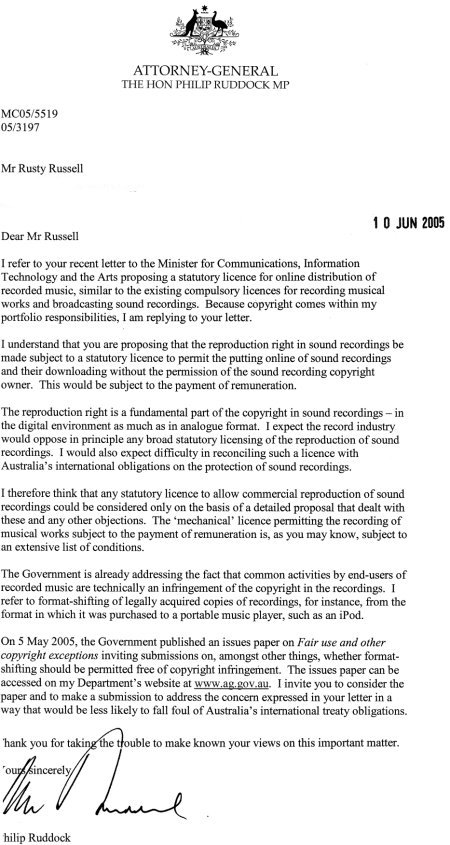Free Software programmer
rusty@rustcorp.com.au
Subscribe
Subscribe to a syndicated
feed of my weblog, brought to you by the wonders of
RSS.
This blog existed before my current employment, and obviously reflects my own opinions and not theirs.

This work is licensed under a Creative Commons Attribution 2.1 Australia License.
Categories of this blog:
IP issues
Technical issues
Personal issues
Restaurants
Older issues:
All 2008 posts
All 2007 posts
All 2006 posts
All 2005 posts
All 2004 posts
Older posts
Mon, 20 Jun 2005
Letter to Minister for Communications, Information Technology and the Arts
I'm concerned about online copyright violation; the root cause seems to be the abject failure to supply, especially in Australia. This is a clear result of too much monopoly power, so the classic answer is to weaken the monopoly and allow the free market to resolve the failure. In copyright terms, that tends to mean a statutory license. Hence I wrote to Helen Coonan, and that department (who, it turns out, are no longer responsible for Copyright) forwarded it to the Attorney General's Department. Here's the letter, and the reply.
The Hon. Helen Coonan,
Senator for New South Wales
Minister for Communications, Information Technology and the Arts
Dear Ms. Coonan,
You may have noticed an article two weeks ago in The Australian which intimated that Australians are being driven to music piracy by the lack of availability of reasonably-priced music online. No doubt there is at least a germ of truth in this, but the true impact of the problem has not been fully explored: consider the case of the phenomenal spread of broadband in South Korea, driven in no small part by their accompanying laxity in copyright enforcement online.
I am not suggesting that we follow South Korea in this regard, but the relationship between widespread availability of content online and the spread of broadband is clear, with all the benefits such a spread brings. However, it is also clear that the wide-eyed and destructive approach the music industry have taken to online distribution, and particularly their refusal to compete, is becoming an increasing source of discontent for the public who want to do the right thing.
Unfortunately, the future of music distribution is looking bleak for consumers. Anyone can set up a CD store today: simply buy CDs and start selling. This has provided a fair degree of competition to sell music to consumers. However, distributing online happens to involve copying, which our Copyright Act prohibits. Because music distribution in the future will be online, noone will be able to set up a CD store without the express and ongoing permission of the publishers. The result is that the music (and movie) labels are set to extend their monopoly on copying to a monopoly on all distribution.
More efficient methods of distribution are crucial to a country the size of Australia, and encouraging their use is a sensible government policy. We must be extremely wary of handing control of distribution to a group who have litigated to prevent such distribution since 1998, placed far more restrictions on online music than on CDs, and whose failure to supply begging customers leaves those customers with few good options.
Thus, I urge you to consider a statutory licence for online distribution, similar to the existing compulsory licensing for radio play and covers. For example, a $50,000 license for online distribution, and a compulsory royalty of 50% of the sale price to be split between the performer and the author. Done decisively, this would encourage real competition as well as innovation in distribution, promotion and music formats. It would delight the public and significantly reduce unauthorized distribution, which will drive further broadband adoption.
Importantly, it will increase the revenue seen by artists, as well as allowing independent artists to sign their own deals with the now genuinely independent distributors.
The current recording industry will hate it.
I look forward to your consideration of this matter,
Rusty Russell,
Canberra.

[/letters] permanent link

